Blues Reviews Oct/Nov 2020
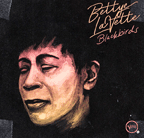 Bettye
LaVette
Bettye
LaVette
Blackbirds
Verve 2020
One need not be the composer of a song to own the song. There is no greater
proof than the work of Bettye LaVette. The Detroit native, now living
in New Jersey, has had a distinguished career since the early 1960s, fraught
though it has been with frustrations and rejections, many detailed in
her 2012 autobiography, A Woman Like Me. Her perseverance and consistent
singing prowess have finally rewarded her with multiple accolades during
the last couple of decades, including a Grammy nomination for her 2018
album, “Things Have Changed.”
Here she is again united with drummer and producer Steve Jordan in a set
which is, according to the liner notes, “conceived as a dialogue
with some of the great African American female singers of the 1950s.”
The songs are well chosen, and buttressed by Jordan’s understated
but solid drum backing. Equally crucial to its success are the offerings
of keyboard man Leon Pendarvis, guitarist Smokey Hormel, and Tom Barney
on stand-up bass. Three songs also sport the appearance of vibraphone,
and four feature a violin and cello string section.
Although each song proceeds at slow to moderate tempo – no rockers
here – interest never flags, due to the unceasingly compelling vocals
courtesy of LaVette. The predominant theme is faded or betrayed love,
as exemplified by the first two tracks, “I Hold No Grudge”
and “One More Song.” The former was co-written by Angelo Badalamenti,
composer of the eerie soundtrack for the television series “Twin
Peaks,” and was previously sung by Nina Simone; it’s a haunting
number with Pendarvis plying organ and Hormel delivering beautiful lyrical
guitar. “One More Song,” composed by Sharon Robinson, long
a writer and singer with Leonard Cohen, has delicate interplay between
vibraphone and piano. Slightly more upbeat is “Blues for the Weepers,”
recorded in 1965 by Della Reese and later by Lou Rawls.
“Book of Lies,” the following track, is introduced by LaVette
singing a cappella; as guitar and bass intermesh nicely, Bettye narrates
an agonized tale of betrayed love; when she sings “Every broken
promise/Broke my heart” the depth of feeling is undeniable. We’re
midway through the set, a good time for some positive vibes as LaVette
digs into “Romance in the Dark,” written and initially performed
by Lil Green and later covered by both Dinah Washington and Nina Simone.
It’s sultry, seductive, simmering. “Drinking Again”
then reprises a Washington number about lost love, with some plaintive
whistling at the end.
LaVette next lays claim to “Strange Fruit,” the angry and
poignant lament about the lynching of African Americans made famous by
Billie Holiday. LaVette’s rendition is at least as moving, and finishes
with some faint but heart-rending moans. “Save Your Love for Me”
written over seventy years ago by bandleader Buddy Johnson and subsequently
recorded by Etta Jones and Nancy Wilson, among others, injects some hope
as Bettye sings of an unrequited but still possible love. The set closes
gloriously with her cover of the classic Lennon-McCartney tune “Blackbird”;
you may favor the original Beatles version because of familiarity, but
this version is superb.
LaVette’s vocalizing is as good as ever. She can maneuver her voice
over several octaves without apparent effort, and express deep wells of
passion, sorrow, and conviction. She is adept at beginning phrases just
before or after the beat, bringing attention to the lyrics of each song.
In summary, this is Bettye LaVette still in her prime.—Steve Daniels
 Mandalyn
Mandalyn
Wrecked
mandalynmusic.com
Mandalyn is an Indiana bred vocalist who has cut her teeth on recording
sessions and by fronting a successful multi-genre band for 15 years. Wrecked,
her debut EP, is an introduction to the blues and R&B world community
at large. Produced by longtime BB King drummer Tony “TC” Coleman
and recorded at Nashville’s Coup de Ville studio, Wrecked acts as
a showcase for Mandalyn’s enormous vocal talents. The band on the
recording includes Coleman on drums, guitarist Bart Walker, bassist Brian
Allen and Frank Ray on keys. The title track opens things up in style,
the Mandalyn-penned “Wrecked,” which may have been a great
vehicle for the late, great Etta James and demonstrates the singer’s
huge range. “Baby on the Run” has kind of a Southern soul
feel, with some Dixie-fied slide guitar riffs, but then morphs into a
short reggae section with a banjo that on paper shouldn’t work,
but somehow sounds great here! Mandalyn’s take of “Feel Like
Breakin’ Up Somebody’s Home” picks up the pace a bit
from the Ann Peebles version but, backed with a strong horn chart, doesn’t
lack any of the emotion. Finally, on Lieber and Stoller’s “I
Who Have Nothing,” a song mostly known as a vehicle for male singers
such as Tom Jones, Ben E. King and Luther Vandross, Mandalyn delivers
a show stopping performance leaving the listener wanting to hear more
of this refreshing new talent. — Bob Monteleone
 Dave
Fields
Dave
Fields
Force of Will
FMJ Records
Dave Fields is a longtime NYC-based composer/producer/arranger (as well
as a regular contributor to this magazine) along with being a first call
session musician. His credits are too numerous to name here, but include
such legends as Aretha Franklin, Tommy James, the Drifters, U2 and more.
He wrote his first score at the age of sixteen for his father, the legendary
bandleader/composer/arranger Sammy Fields. But first and foremost, Dave
is an incredible guitarist, with a formidable array of chops in many styles.
He’s been releasing albums under his own name about every two or
three years, the last being Unleashed in 2017. While most of his previous
releases showcase a blues foundation with aspects of funk, fusion and
rock, Force of Will takes a decided turn towards ‘70s hard rock.
We’re talking “turn the car radio all the way up and roll
the windows down” HARD ROCK. Sure, there’s the slow blues
“Why Can’t You Ever Treat Me Right” and the slightly
faster “It’s Not OK”. But, Fields mostly puts the pedal
to the metal. The opener “I Love My Baby” starts innocently
enough, with a “Le Grange-y” intro riff, met with a rootsy
harmonica, but soon EXPLODES into a rip roaring shuffle with screaming
B3 organ and Allman-esque slide guitar. “Big Block” ups the
ante even more, starting with Fields whammy-ing the shifting gears of
a motorcycle or racecar culminating into a breathtaking breakdown featuring
the hottest two-handed technique this side of Eddie Van Halen and then
some pick-sweeping arpeggios that would make metal virtuoso Paul Gilbert
blush. The influence of Jeff Beck looms large throughout, especially on
“Jack Ham Her”, where Fields cops Beck’s former sparring
partner, keyboardist Jan Hammer to thrilling effect. Those helping out
on the album include Steve Morse drummer Van Romaine and the bassists
Buddy Allen and Erik Boyd. Dave’s buddies from the globetrotting
Norwegian band Blues Express, drummer Kare Amundsen and bassist Bjorn
Hagset, play on the track “It’s Not OK”. All in all
a great sounding disc that radio and streaming programmers can slot into
many formats.— Bob Monteleone
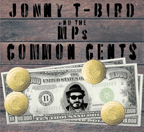 Jonny
T-Bird and the MPs
Jonny
T-Bird and the MPs
Common Cents
Jonny T-Bird & the MPs
Guitarist/singer Jonny T-Bird Neuberger fronts the Milwaukee-based blues
band Jonny T-Bird & the MPs. They are steeped in Chicago-styled blues,
not surprising, considering their proximity to the Windy City. Their full-length
self-release, Common Cents, is their third studio album since 2013’s
Let’s Do This! and 2018’s live recording Hot Stuff: Live at
the Red Dot.
Common Cents features band members “Cadillac” Craig Carter
on bass and drummer Marcus “MG” Gibbons, who tragically passed
away before the completion of the album, replaced by Nikki Beckman on
a couple of tracks. Pierre Lee and Jane Barry Fraundorf provide keys and
Aaron Gardner’s horn arrangements spice up three of the songs with
Gardner on sax and Eric Jacobson on trumpet. Eleven of the thirteen songs
are written by Jonny T-Bird, the two covers are Otis Redding’s “Mr.
Pitiful” and the Albert King slow blues “Everybody Wants To
Go To Heaven,” both soulfully sung by bassist Carter.
“Can’t Pick It Up” starts the album with a catchy dual
guitar riff intro and outro and features a scorching solo from T-Bird.
“Birthday Blues” follows with an original take on the birthday
theme that already sounds like an old standard, with a supportive horn
chart and a capoed guitar ala Jimmie Vaughan. T-Bird blows some nice harp
on “Mary, Queen of Scotch,” about a lady whose love of alcohol
proves too much to handle. “The T-Bird Gets T-Boned” is a
nice change of pace, a swinging jazz instrumental with a horn section
lead line featuring a throaty tenor solo from Aaron Gardner. The talented
T-Bird plays some tasty Jimmy Reed-inspired harmonica on “Old Dog.”
“Chickens Don’t Like Me” offers some interesting tremolo
and capoed guitar tones with a clever lyric. The intimate “No Ship”
closes things out in style with a solo guitar and vocal performance by
the leader. All in all, Common Cents is a solid representation of the
many talents of Jonny T-Bird and his band, with plenty of stylistic turns
to keep the listener engaged throughout the thirteen tracks. —Bob
Monteleone
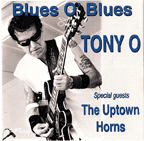 Tony
O
Tony
O
Blues O’ Blues
Top of the Blues Records 2020
New York City native Anthony Melio reportedly was dubbed Tony O by Howlin’
Wolf and his guitarist Hubert Sumlin, and in this set of ten tracks Tony
covers songs by Muddy Waters and Muddy’s original guitar collaborator,
Jimmy Rogers…but the set confirms Tony’s citation of B.B.
King as his prime inspiration. Three tracks are covers of B.B. tunes,
and Tony’s guitar style reflects the influence of the late “King
of the Blues.”
This set showcases Tony’s strengths as guitarist, harmonica player,
and singer. Supporting him is a strong cast led by second guitarist Chumslick
Nick - a cool tongue-twister of a moniker! - and Mike Severino on drums.
Bass chores alternate between Angelo Olivieri and album producer Bob Stander,
and keyboards between John Wynwood and Boogie Bob Erikson. Adding to the
festivities on five tracks is The Uptown Horns quartet of trumpet and
three saxophones.
Surprisingly, the opening cut, “You Upset Me,” a B.B. King
composition, presents Tony playing his axe in his own upbeat style rather
than B.B.’s. The following original, though, which is the title
tune, is a slow number proving that he has learned his B.B. licks well;
King would have been impressed. The track benefits from some fancy piano
courtesy of Wynwood. It’s followed by another B.B. number, “So
Excited”; the band gets excited! and gooses up the tempo, Olivieri
and Severino providing a zesty rhythmic kick and Crispin Ceo dishing out
a pithy saxophone solo. A little later the third B.B. tune, “Woke
Up This Morning,” sustains the groove, albeit with a tad less snap.
The same effective treatment is applied to Muddy Waters’ “My
Love Strikes Like Lightning,” Muddy rarely used a horn section or
featured B.B. lead guitar riffs, but it sounds good.
Also sounding good are a couple of shuffles, “You’re Sweet”
by Jimmy Rogers and “Keep on Movin’,” another Melio
original. Both click along nicely, the former abetted by Erikson on keys.
Each displays Tony delivering some no-frills, good-fills harmonica playing.
His harp is also prominent on the set’s closing number, the zippy
instrumental “Just Drive.”
Oh, it’s worth mentioning that Tony also applies his tenor vocals
to a couple of ballads, another Rogers tune and one by soul and rhythm-and-blues
singer Brook Benton, illustrating that his talent is not restricted to
twelve bar Chicago blues.—Steve Daniels
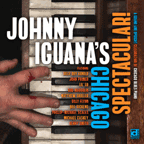 Johnny
Iguana
Johnny
Iguana
Chicago Spectacular!
Delmark CD
As liners author Bill Dahl arrestively puts it, “The art of Chicago
blues piano is in excellent hands as long as Johnny Iguana is in town.
He’s assembled some of the Windy City’s greatest traditional-minded
blues artists for this disc to provide stunning vocals as he pays tribute
to seven of Chicago’s legendary ivories heroes—giants who
serve as some of Iguana’s primary influences” —from
ill-fated Joshua Altheimer, Little Johnny Jones (best known for his years
with slashing slide guitarist Elmore James), Big Maceo Merriweather (
he of the “rumbling bass runs and hard hitting melodic lines”)
and the prolific Memphis Slim to powerhouse keyboardist Sunnyland Slim,
Johnny “Moose” Walker ( “his two-fisted attack was as
wild and ebullient as the man himself”) and the ultimate Chicago
blues pianist, Otis Spann, who was jubilant on the houserockers and back
in the alley for after-hours excursions. Harpist Billy Boy Arnold joins
Iguana on both a tenacious “Hot Dog Mama” and a boogie-fied
“You’re An Old Lady” while John Primer handles the imposingly
muscular vocals on both Roosevelt Sykes‘ classic “44 Blues”
and the pulsing “Down In The Bottom” and youthful Chicagoan
Phillip-Michael Scales who renews street poet and rap forerunner Gil Scott-Heron’s
“Lady Day And John Coltrane.” It’s my favorite track
here along with the deck’s four boisterous, highly inventive instrumentals,
derived from Iguana’s Claudettes repertoire. Other contributors
include the likes of Bob Margolin, Kenny Smith, Lil’ Ed, Matthew
Skoller and Billy Flynn. A blues album like no other, being traditional
yet utterly contemporary!—Gary von Tersch
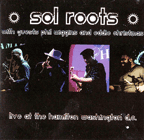 Sol
Roots
Sol
Roots
Live at the Hamilton, Washington, D.C. 2020
From the mid-Atlantic coast, guitarist and singer Sol Roots has delved
into multiple genres over the years in addition to blues: jazz, reggae,
funk, and soul among them. This brief half hour release finds him delighting
an avid audience with five lengthy workouts, in cooperation with bassist
Andreas Holmstrom, drummer Eddie Christmas, and featured guest Phil Wiggins
on the “Mississippi saxophone.”
The set is bluesy, and definitely jazzy. Opening is a cover of the Grateful
Dead standard “Sugaree.” Sol’s tenor vocalizing reminds
me of the style of the late jazz and blues pianist/vocalist Mose Allison,
less for its timbre than for its phrasing. Mid-track, Sol molds the phrase
“shake it” into a repetitive mantra, reminiscent of the mesmerizing
repetitions of Allison, Van Morrison, and many Mississippi hill country
blues performers. Meanwhile, Wiggins reveals the harmonica prowess that
has earned him his deserved international reputation…but instead
of playing in country mode a la Sonny Terry, he delivers spates of rapid-fire
notes traveling up and down the scale.
“Goin’ Home” follows; it’s a nearly seven-minute
upbeat shuffle introduced by a compelling bass line and driven by syncopated
drumming, Wiggins again cruising on harmonica while Sol maintains a relatively
low guitar profile. “I Bet You” slows the tempo and has an
atmospheric vibe, with Roots’ guitar and Wiggins harp playing several
impressive bars in unison.
In my opinion, the set’s highlight is “Roberta,” a Wiggins
composition. It is the purest blues of the set, with Wiggins sharing the
vocals with Sol, and the two of them harmonizing nicely on the refrain.
Wiggins offers a delicious harmonica solo, followed by an equally tasty
Sol guitar solo, and the track ends with the two principals trading licks
in call-and-response fashion.
Last but not least is a rendition of the hoary “St. James Infirmary.”
The song has been covered literally hundreds if not thousands of times
by innumerable performers, but there is always room for new interpretations.
The quartet turns this version into an upbeat danceable affair, drums
and bass again providing a simmering rhythm foundation for Sol and Phil
to add their leads. It’s a hot coda to a churning set.—Steve
Daniels
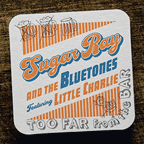 Sugar
Ray & The Bluetones
Sugar
Ray & The Bluetones
Featuring Little Charlie Too
Far From The Bar
Severn CD
Too Far From The Bar—what a great title!—is the latest from
veteran harmonica ace and charismatic vocalist Sugar Ray Norcia and his
dynamite Bluetones (pianist Anthony Geraci, acoustic bassist Michael
Mudcat Ward, drummer Neal Gouvin) and, fortunately for blues fans everywhere,
also features the recently late and widely lamented guitarist Charlie
Baty—whose off-handedly informative liners here are a revelatory
gas as well as his patented stinging, retro-toned guitar work. Produced
by big-eared Duke Robillard, who also adds some mmmm! guitar licks to
four tracks here—picks are the utterly mellow “Too Little
Too Late” along with the great Coasters-like, cautionary playlet
“The Night I Got Pulled Over.“ This project was recorded at
Severn Sound Studio in Annapolis, Maryland and boasts 15 tracks including
the juke joint jumping title tune (a Norcia composition) as well as a
host of well chosen covers leading off with a JUMPING recall of the 5
Royales’ “Don’t Give No More Than You Can Take”
and including numbers from the likes of Sonny Boy Williamson (“Bluebird
Blues”), Jerry McCain (“My Next Door Neighbor”), Little
Walter (“Can’t Hold Out”) and Otis Spann (“What
Will Become Of Me”)—with Geraci vividly channeling the spirits
of both Otis and Pinetop Perkins—as well as the blues/jazz chestnut
“I Got A Right To Sing The Blues.” Band-composed originals
that hit the sweet spot to these ears include the easy rocking “From
The Horse‘s Mouth,” the confessional “What I Put You
Through” and the lengthy, sentimental “Walk Me Home.”
Also checked are two versions of the instrumental, true-to-life “Reel
Burner,” a groovy dance tune that got so hot that it actually set
one of the studio’s multi-track tape machines ablaze! Recommended.—Gary
von Tersch
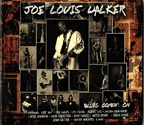 Joe
Louis Walker
Joe
Louis Walker
Blues Comin’ On”
Cleopatra Blues 2020
By now, of course, Joe Louis Walker has nothing to prove. The seventy-year
old is one of the elder statesmen of the blues, although his energy level
seems more consistent with that of a musician years younger. A member
of the Blues Hall of Fame, he has been nominated for an astounding fifty-nine
Blues Music Awards and won six. His career includes years of touring internationally
and twenty-seven albums.
This newest release reprises the mode of his 2010 album “Blues Conspiracy,”
recorded on a Legendary Rhythm & Blues Cruise and featuring a slew
of guest collaborators. A studio effort, “Blues Comin’ On”
consists of a dozen tunes, five written or co-written by Walker, and each
showcasing his talent along with a guest luminary (or two). With just
a couple of exceptions, each track reaps the talents of the dazzling rhythm
duo of bassist John Bradford and drummer Dorian Randolph; Juma Sultan
lends frequent percussion accompaniment, and the keyboards are adeptly
handled alternately by Philip Young, Eric Finland, and the seemingly ubiquitous
Bruce Katz.
Not every track clicks smoothly, but all are listenable and several are
stellar. The opening track, “Feed the Poor,” reflects Walker’s
social consciousness, and sports none other than Jorma Kaukonen on guitar,
whose career for the last couple of decades has been more about acoustic
than electric guitar…but here his lead contribution is a return
to the psychedelic vibes of his time with Jefferson Airplane and electric
Hot Tuna. Another septuagenarian, guitar legend Albert Lee, makes an appearance
on “Seven More Steps,” demonstrating his continued ability
to combine lyricism and lightning speed.
One of the revelations of the set is the singing of Carla Cooke, who appears
in duet with Walker on two slower tunes, “Someday, Someday”
and “Awake Me, Shake Me.” I was previously unfamiliar with
her, but her gorgeous voice and particular style evoked memories of Diana
Ross and, in her ability to soar suddenly into emotive upper registers,
Laura Nyro.
Other familiar names who grace the set include guitarists Eric Gales,
Keb’ Mo’, David Bromberg, and session musician extraordinaire
Waddy Wachtel, and harmonica players Rick Estrin, John Sebastian, and
Lee Oskar. Early rock-and-roller Mitch Ryder shares vocal chores with
Walker on “Come Back Home,” penned by Bradford. There is a
nice shuffle, “Old Time Used to Be,” with Walker playing twelve
string guitar; there are two cuts ranging into funk territory; and the
final track, “7 & 7 Is,” is a rocker with Joe Louis’s
singing sounding strikingly like Mick Jagger.
Perhaps most notable is the album’s title tune, co-written by Dion
(DiMucci), famed 1950s and 1960s rock-and-roller whose singing voice is
still terrific. Dion opened his own recent album with the song, in tandem
with guitarist Joe Bonamassa. Here he and Walker turn it into a rousing
gospel blues replete with four – four! – guitarists: Walker,
Wachtel, Gales, and Dion.
This set is no vanity project. Walker takes few guitar leads, mostly deferring
to his friends, and often shares vocals. His playing and singing are top-notch,
though. The man has entered his eighth decade in fine form.—Steve
Daniels
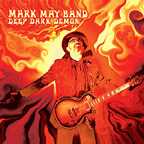 Mark
May Band
Mark
May Band
Deep Dark Demon
Gulf Coast Records www.gulfcoastrecords.net
This is the 7th release for the award-winning guitarist/vocalist/songwriter
Mark May. For over 20 years May has established himself in the Texas blues
scene as a solid performer and a musical raconteur. The Mark May Band
has appeared at numerous festivals such as Telluride Blues and Brews,
King Biscuit and Dallas International Guitar Show. May also recorded with
Dickey Betts and Great Southern for several tours and an album.
When you have all that kind of life experience under your belt there are
a lot of creative touchstones to draw from. May and company take a number
of musical liberties and treat the listener to one wild ride. “Harvey’s
Dirty Side” kicks things off, with a supernaturally-charged tale
featuring May’s wicked slide work. The rhythm section of bassist
Darrell Lacy and drummer Brandon Jackson percolate underneath as the dynamics
shift from hot to cool to a well-measured tsunami. “BBQ and Blues”
follows and is a good-natured mid-tempo I-IV-V shuffle. He sets the stage
here for a real party, with help from second guitarist Billy Wells playing
some tasty unison lines. The combo of May, Wells and Lacy on vocals lock
down a catchy hook, with their sweet harmonies. May sings of a man reflecting
on his past in the song “Back.” The groove is Latin and Santana’s
hit “Smooth” comes to mind. An intricate arrangement and solos
define this one as May lets loose, with singing sustain and rhythmic abandon.
The collective finale here is simply off the chain! The title track features
the line “He’s got a deep dark demon in his soul.” And
May delivers that lead vocal with all the fire and brimstone of an Evangelical
preacher. Mike Zito guests and trades solos with the leader for an incendiary
exchange. The song sequence changes up a bit for the very soulful “Sweet
Music.” It’s got a universal theme about the power of music
and truly connecting with an audience. May plays some great wah-wah guitar
supported by Brandon Jackson’s slippery hi-hat figure and Barry
Seelen’s grooving B3 keys. As aforementioned, May and his crew have
been around, and they bring a flavor of New Orleans to the table. “Rolling
Me Down” has a calypso/Cajun feel, with syrupy smooth twin melodic
lines from May and Wells holding it all together. This tale of being smitten
by a sweet Louisiana gal gets an added push from Seelen’s rollicking
piano. “My Last Ride” almost sounds like an outtake from an
early Allman Brothers record. Twin leads set this one off as May sings
about personal redemption and change. Lacy’s bass is prominent as
this tune rocks, with a “Whippin’ Post”-like bravado.
The next track “For Your Love” would not be out of place on
jazz or adult contemporary radio formats. There’s a Bobby Caldwell/
Al Green kind of vibe here. This has great hooks, with some stellar tenor
sax work by Eric Demmer. “Walking Out That Door” follows and
has a dense production quality to it. There is a lot going on, with cool
twin guitar leads and nice breakdowns where the drums and bass can step
out for a few bars. Shifting modulations and over the top guitar work
make this a standout. “Something Good” is a nice easy going
tune, with a gospel-tinged and soul- stirring message. “We all need
something good in our lives” is a central line here, with a focus
on hope, solace and peace of mind. They conclude the festivities, with
the very funky “Invisible Man.” The groove is righteous as
May makes a plea to his woman to see him for who he is. Shades of Frampton
or Walsh, the leader even steps out with a talk box solo. It’s a
strong and rhythmic number that assuredly should really connect with live
audiences.—Eric Harabadian
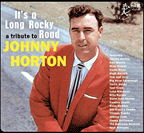 A
Tribute To Johnny Horton
A
Tribute To Johnny Horton
It’s A Long Rocky Road
Atomicat CD
Johnny Horton was killed in a Texas automobile accident in November, 1960
at the apex of his popularity following a succession of pop hits with
country-based story and saga songs like “Springtime In Alaska,”
“Battle Of New Orleans,” “North To Alaska” and
“Sink The Bismarck.” Despite the broad appeal of their lyrical
content he boldly utilized various elements of then-conventional acoustic
country instrumentation and, in retrospect, was an important artist
in breaking down the, at the time, rigorous classification of country
and pop singers. Early on, he recorded initially for Dot and Mercury before
moving to Columbia, where he scored a string of rockabilly-influenced
country hits such as “Honky Tonk Man” and “Honky Tonk
Hardwood Floor” before his success in the pop charts. This long
overdue and welcome tribute project opens intentionally with ten relatively
obscure numbers from early in Horton’s brief career—picks
encompass a couple of neat album cuts—Dot’s “Go And
Wash Your Dirty Feet” and Columbia’s rowdy “Joe’s
Been A-Gittin’ There”— along with the circa 1951 title
song, “The Golden Rocket” (another number from that Columbia
LP) and a couple of Mercury cuts from 1952 and 1953—respectively
“Red Lips And Warm Red Wine” and “First Train
Headin’ South.” Onto the twenty tracks of covers of
songs associated with Horton. There are a couple that eluded my merit
but titles like Clyde Stacy’s rousing recall of “Honky Tonk
Hardwood Floor” and Tom and Jerry’s great interpretation of
Link Wray’s classic “Rumble” along with Johnny Cash’s
Sun-sounding version of a Cash/Horton co-write, “I’d Still
Be There” and a couple of nifties by The Ballroom Rockets—“Broken
Hearted Gypsy” and “The Train With The Rumba Beat” among
others that also hit that “sweet spot.” All session details
and a few artist photos complete this commendable package.—Gary
von Tersch
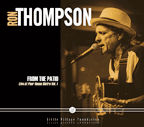 Ron
Thompson
Ron
Thompson
From The Patio
Little Village CD
Informatively subtitled Live At Poor House Bistro/ Volume One, this project
contains eleven live recordings from San Jose’s intimate Poor House
Bistro, where the late Bay Area blues legend Thompson and his bandmates
held sway on Wednesday nights for more than 14 years. Thompson is most
remembered for his uncommon and combustible guitar playing, especially
his intense, killer slide-work but the multi-talented musician also sang
the blues more assuredly than most, with barely harnessed emotion, plenty
of soul and, perhaps most tellingly, energy—just give his delivery
on a reworking of The Soul Clan’s ballad “That’s How
I Feel,” a listen. Special guests include another vastly under-appreciated
Bay Area blues legend, harmonica virtuoso Gary Smith, who delivers the
goods on Little Walter’s prototypal “One More Chance With
You” along with Little Village’s Jim Pugh, who provides riveting,
soul-saturated organ on covers of both Lowell Fulson’s “Sinner’s
Prayer” and Guitar Slim’s “Done Got Over It.”
Imposing guitarist (and producer) Kid Anderson also shines on a couple
of cuts—the sensual, slide guitar-driven “When You Walk That
Walk” (a Thompson original) and Buster Brown’s straight ahead,
low-down tale of “Dr. Brown.” Credit and plaudits also due
to the sets’ worthy pianist Sid Morris as well as the on-the-spot
rhythm section with Scotty Griffin on the skins and either Dave Chavez
or Gary Rosen on bass. Also noted are the deck’s other two Thompson
originals—an easy rocking “Mardi Gras Boogie” and the
declarative “The River Is Rising,” If you’re in the
area, stop by the Bistro on some Wednesday night—where only his
music is allowed on the jukebox. Play loud! —Gary von Tersch
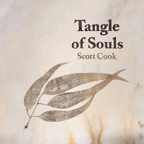 Scott
Cook
Scott
Cook
Tangle Of Souls
Canada Council For The Arts CD/Book
Scott Cook is a globetrotting troubadour who has been constantly on the
road since 2007, averaging 150 shows and over a dozen festivals a year
while also finding time to produce seven studio albums along the way.
His latest is a twelve song collection that comes with a 240-page, cloth-bound,
hardcover book that tells a “hard truth” story of a life-altering
health crisis while depicting parallels to the troubles we face as a society
ostensibly hell-bent on an ambiguous future and self destruction. Throughout,
Cook’s plain-spoken, often achingly authentic songwriting is front
and center, ably supported by intrepid acoustic arrangements, courtesy
of his outstanding Australian string-band, the She’ll Be Rights.
Ten of the songs are unabashedly riveting, emotional Cook originals—from
the contemplative “Tulsa,” the metaphysical “Just Enough
Empties” and the nostalgic “What To Keep” to the steadfast
commentary “Say Can You See,” the wide-eyed title tune and
the sauntering banjo and fiddle-driven instrumental “Right To Roam.”
The other two are deft covers of Scotty Dunbar’s questioning “Why
Am I Leaving My Home Again” and a stunning reworking of Dick Blakeslee’s
1940’s activist anthem “Passin’ Through.” In these
terrifying times this is a fearless look in the mirror that still sees
something worth saving—do yourself a favor and check it out.—Gary
von Tersch
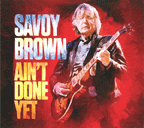 Savoy
Brown
Savoy
Brown
Ain’t Done Yet
Quarto Valley
Legendarily enterprising and still active blues-rock band Savoy Brown
was formed in south west London 55 years ago (!) and has long been based
in upstate New York. The trio’s latest project (their 41st album)
follows hot on the heels of their critically acclaimed 2019 release, City
Night, with leader/songwriter Kim Simmonds (guitar, harmonica and vocals)
alertly joined by equally adept bandmates Pat DeSalvo (bass) and drummer
Garnet Grimm on ten nifty Simmond originals. Picks include the hard-chugging,
a la the likes of Canned Heat, “All Gone Wrong” (with Simmonds
using his signature Gibson Flying V on the solos), a moody instrumental
that closes affairs called “Crying Guitar” and “Rocking
In Louisiana” (Simmonds comments: “This is my nod to where
the music I love was born. The song is about a person going to Louisiana
to forget responsibilities and to simply have a good time. I used my steel
dobro to give the song a traditional vibe and that acoustic feel runs
under the whole track”) as well as the John Lee Hooker-inspired,
tactile boogie “Jaguar Car,” an eerily descriptive “Devil’s
Highway” and the raga-inspired, slide guitar driven, a la George
Harrison, “River On The Rise.” Other head-cockers include
the wanderlust-infused and utterly melodic “Feel Like A Gypsy”
and the talking blues “Borrowed Time”—with Simmond’s
great, trepidacious high-wire guitar tone due to “An old Multivox
FullRotor,” as he puts it. Long live Savoy Brown!—Gary von
Tersch
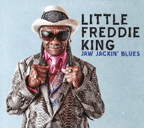 Little
Freddie King
Little
Freddie King
Jaw Jackin’ Blues
Made Wright Records 2020
Little Freddie King and his long-time drummer and producer “Wacko”
Wade Wright have released an album that had me alternately laughing, gyrating,
and gasping in amazement. This is a blues album only by a large stretch
of the imagination; if not jaw-jackin’, it is jaw-dropping. It’s
a fascinating experiment, and, unless I’ve missed some other obscure
release, it’s one of a kind.
King, whose real name is Fread Martin (he’s a cousin of the late
Lightnin’ Hopkins), has just entered his ninth decade of life, most
of it spent in New Orleans, where he is a musical icon, fixture of the
local blues scene, and member of the Louisiana Music Hall of Fame. His
life has been eventful (actually an understatement; research him online)
and his career long. Only a year ago I reviewed here Little Freddie King’s
last release, “Absolutely the Best,” and labeled it a tasty
amalgam of New Orleans and Mississippi hill country blues styles. This
one is best characterized as hill country melded with funk, hip-hop, and
electronica.
Yes, electronica. When I began listening, I went back to the CD sleeve
to check the list of musicians…only Freddie is listed, as guitarist
and vocalist. The explanation: Sampling, attributed to Tino Gross of Funky
“D” Records; everything except Freddie is sampled. There are
wails, hoots, screeches, drones, chug-a-lugs, nicely harmonized vocal
choruses, dissonant instruments of various genres…it’s a veritable
encyclopedia of ambient and manufactured sounds.
Amidst the wall of sound are some traits typical of King’s music:
minimal lyrics in each song, repeatedly repeated; a deep Southern vocal
drawl making some of the lyrics difficult to discern; lyrics mostly spoken
rather than sung; lyrics referencing his colorful past. The formula is
applied to a few new songs, and to several recorded multiple times in
the past, such as “Crack Ho Flo” and “Mixed Bucket of
Blood.” The only nod to “traditional” blues is the final
track, “Trip to Detroit,” with much less sampling and a Bo
Diddley groove. (King toured with Bo Diddley in the 1970s.)
Let’s hand it to eighty year old Little Freddie King, still going
strong and still eager to try something new.—Steve Daniels
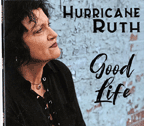 Hurricane
Ruth
Hurricane
Ruth
Good Life
American Showplace Music 2020
She was born and raised in the Midwest, and still lives there, so should
she more accurately be dubbed Tornado Ruth? Either way, her moniker accurately
stresses the power of her singing.
Since her last and justifiably praised album, 2017’s “Ain’t
Ready for the Grave,” Ruth LaMaster has gathered a new set of musicians
to back her, with no loss of effectiveness. The drum kit of this ensemble
is commanded by the lauded and seemingly ubiquitous Tony Braunagel, and
the equally familiar Bruce Katz mans the keyboards. Calvin Johnson on
bass completes the rhythm section, and guitar chores are in the capable
hands of Scott Holt. The group corrals ten songs, eight of them LaMaster
originals, into a curt but compelling set of zesty blues rockers, with
a couple of ballads thrown in for good measure.
Not surprisingly, the set commences like wildfire with “Like Wildfire,”
a raunchy rocker driven by Katz on piano. Holt takes the instrumental
spotlight with gritty guitar lead on the two ensuing mid-tempo shuffles,
“Dirty Blues” and “What You Never Had,” Katz switching
to Hammond B3 organ on the latter. The entire ensemble meshes superbly
on the following title track, a six-plus minute slow blues proving that
Ruth doesn’t have to rock to impress convincingly.
The remaining tracks hew to the same pattern of alternating pace with
skilled musicianship. “Who I Am” leads off with a drum and
bass introduction reminiscent of Jimi Hendrix’s “Foxy Lady.”
“Torn in Two,” written by Grammy winner Gary Nicholson, is
a standout, as is the penultimate tune, another galloping rocker, “Late
Night Red Wine,” sure to fill the dance floors. The set ends with
the only other cover, the leisurely but inspirational “I’ve
Got Your Back,” Katz’s gentle piano providing contrast to
LaMaster’s lusty vocal. It’s a fitting capstone to a solid
album by one of the most potent contemporary blueswoman vocalists.—Steve
Daniels
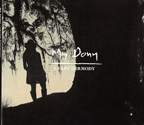 Grant
Dermody
Grant
Dermody
My Dony
Self-produced 2019
Seattle native Grant Dermody is a maestro of the hand-held reeds whose
career of over two decades has encompassed singing, songwriting, and teaching
as well as deployment of his harmonica talent in collaboration with such
eminences as Honeyboy Edwards, Eric Bibb, John Cephas, Big Joe Duskin,
and Robert Lowery. His range spans gospel, folk, and Chicago and New Orleans
blues styles and his formats include both electric band and acoustic duos.
His fourth solo release presents him in ensemble with co-producer and
guitarist Dirk Powell; bassist Jason Sypher and drummer Jamie Dick round
out the core group.
Several notable guests step in as the thirteen tracks unfold. Before any
guests appear, we’re treated to the spare title tune. (Dony, usually
spelled doney, is a folkloric word for lazy woman.) Dermody capably handles
the vocals with his unassuming tenor voice, and is heard overdubbed, as
on many cuts, simultaneously playing harmonica; on this first track Powell
plays both guitar and piano. Dermody is noted for his pure harmonica tone,
and it’s evident here and throughout. In a similar spare vein is
“Springtime Blues,” attributed to Sonny Boy Williamson I,
although it certainly sounds like the classic “Sitting on Top of
the World” with different lyrics, a smattering of Muddy Waters’
“Sail On” thrown in.
Interesting and innovative is “Real Time Man,” the set’s
longest number, a Dermody original which sports harmonica deployed in
John Lee Hooker style in tandem with accordion by Corey Ledet: boogie
meets the bayou. “Corner Strut” is likewise a hybrid, Ledet
offering both accordion and rub board as Mississippi hill country blues
meets zydeco; Ledet later plays the same two instruments on “Morning
Train,” a straightforward zydeco number. The set segues into gospel
with a fine cover of the traditional “Great Change,” buttressed
by harmony vocalists Powell, Rhiannon Giddens, and Allison Russell.
Definitely worthy of attention are also “Too Late to Change Your
Mind” and “35-59,” the former slow-paced and the latter
upbeat and each allowing optimal interplay between Dermody’s vocals
and harmonica and Powell’s guitar, and the set closes with another
zippy Dermody original, “Hometown Blues.”—Steve Daniels
 Andrew
Alli
Andrew
Alli
Hard Workin’ Man
EllerSoul Records 2020
Andrew Alli was a latecomer to music, not delving into the art form until
he was twenty. Now, thirteen years later, the Richmond, Virginia native
and resident has established his name in the East Coast blues world and
parts more distant. Comfortable as leader of a full band, he has also
found success as harmonica meister in duos with guitarists Josh Small
and Jontavious Willis.
Alli arguably first attained national recognition for his participation
in the 2016 release “Blues for Big Walter,” a tribute to the
late harmonica legend Walter Horton. On his two tracks on that album he
was accompanied by guitarist Ivan Appelrouth, who sadly died in February
2020. “Hard Workin’ Man” is Alli’s debut solo
album and will be welcomed by blues lovers keen on discovering new and
ascendant talent.
The twelve tracks clock in at only forty minutes but present a good example
of Alli’s range. Produced by Alli, the set was engineered by West
Coast guitarist Jon Atkinson, who plays bass throughout. Danny Michel
provides guitar, and Buddy Honeycutt and Devin Neel alternately command
the drum kit. Tickling the ivories is piano master Carl Sonny Leyland…
although sadly his contributions are scant and are low down in the sound
mix.
Of the dozen songs, nine are Alli compositions. The three covers were
penned by George “Harmonica” Smith, Big Walter Horton, and
Little Walter Jacobs, three harmonica mavens whom Alli cites as major
influences (as well as Kim Wilson, Phil Wiggins,Gary Primich, William
Clarke, Junior Wells, and Sonny Boy Williamson I and II). Most revealing
of those influences is his cover of Little Walter’s “One More
Chance”: the no-frills production values deliver a performance of
raw Chicago blues. Alli proves his proficiency on harp with a panoply
of chords, vibrato, and both terse and sustained single notes. That proficiency
is given full rein in the three instrumentals of the set, “Chrom-A-Thick”
(yes, chromatic harmonica), “Walkin’ Down” (sporting
one of the few guitar solos of the album), and the Big Walter tune “Walter’s
Sun.”
There are a few minor caveats: the mixes of the first two tracks are slightly
muddy, with some dissonance between guitar and harmonica, and Alli’s
tenor vocalizing is not always pitch-perfect, although potent and pleasing.
All in all, “Hard Workin’ Man” provides gritty Chicago
harmonica blues and portends a bright future for Andrew Alli.—Steve
Daniels
Home
/ Blues Blogs /
Artist Links / Blues
Links / Videos / Store
Subscribe / Advertise
/ Back Issues
/ Contact / Staff